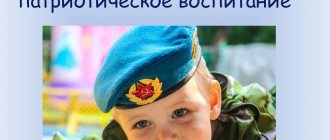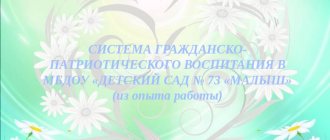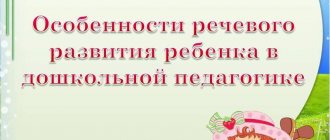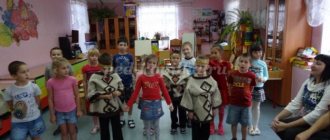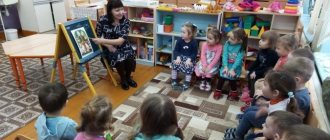Patriotic education of pedagogical university students through business games
Bibliographic description:
Goryachev, V. N. Patriotic education of students of a pedagogical university through business games / V. N. Goryachev. — Text: direct // Theory and practice of education in the modern world: materials of the IX International. scientific conf. (St. Petersburg, July 2021). - St. Petersburg: Own publishing house, 2021. - pp. 109-111. — URL: https://moluch.ru/conf/ped/archive/192/10780/ (access date: 11/21/2021).
Patriotic education of pedagogical university students through business games
Goryachev Vladimir Nikolaevich, student
Scientific supervisor: Derecha Irina Ivanovna, candidate of pedagogical sciences, associate professor
Ishim Pedagogical Institute named after P. P. Ershov (branch) of Tyumen State University
Patriotic education of students through business games
Goryachev Vladimir Nikolaevich, student
Research supervisor: Derecha Irina Ivanovna, candidate of pedagogical sciences, associate professor
The Tyumen state university, branch in Ishim
The author of the article conducted a study of issues related to the patriotic education of students at a pedagogical university. The article discusses the goals and objectives of patriotic education of students; a business game is considered as an effective method of patriotic education of students.
Key words : patriotic education, diplomacy, business game, model, educational process
Patriotic education is part of the comprehensive development of the individual. This aspect of education is carried out in educational and extracurricular activities.
In addition to the social environment, as a significant factor in the formation of personality, there are other factors influencing a person. One of them is education. It consists in creating a narrower pedagogically sound environment that purposefully shapes a moral personality. Of course, the social environment has a significant impact on the teaching environment, including the student environment. At the same time, this narrow environment is not only part of the wider (social) environment, which has common characteristics with it, but is a relatively independent part with its own individual characteristics. Moreover, if this narrow environment is created for a special purpose - the formation of a moral personality. Therefore, even in an insufficiently favorable environment in our society, it is possible and necessary to create special pedagogical conditions that develop morality as a moral basis for education.
Education is the purposeful activity of a teacher to create conditions for the development of a student and the formation of certain personal qualities in him, which occurs through his inclusion in various types of social relationships (in study, in communication, play, practical activity) [4, p.5].
By patriotic education we understand the interaction between the teacher and the student with the aim of developing knowledge about the rules of social behavior, developing patriotic qualities, and accumulating experience in patriotic activities. Patriotic education is very closely related to moral education. Morality includes the internal, spiritual qualities that guide a person, ethical standards, and rules of behavior determined by these qualities. We share the point of view of I. I. Derech that morality is always formed with the individual, constitutes the principle of its existence, and is inseparable from the content of the “I”. Morality is associated with external expediency, and morality is associated with free goal-setting and self-determination of a person [5, p.11]. Moral qualities are formed through a moral lifestyle, for example, in the process of working in personal and public interests, decent behavior in society, developing discipline, responsibility, an active life position, helping one’s fellow workers or students, showing devotion and integrity, education in the spirit of civic duty, honor and conscience. Most of these qualities are entirely related to the political structure of the state and society, its culture, traditions, and way of life.
At the Ishim Pedagogical Institute named after. P.P. Ershov conducts business and role-playing games among students with the aim of patriotic education of future teachers. Games, which are partly not didactic and aimed at developing patriotic and moral qualities, are also capable of developing in students a personal attitude towards politics, diplomacy, international relations, and an understanding of the general economic and political picture of the world. We, following Derecha I.I., believe that a business game in a pedagogical university is a means of developing professional creative thinking; during its course, students acquire the ability to analyze general situations and solve new professional problems [6]. It is worth noting that when developing personal qualities in students, and in particular patriotic ones, diplomacy plays an important role as a type of business game. Also, diplomatic games, along with role-playing games, develop communication and organizational skills.
Diplomacy is a set of practical activities, techniques and methods used taking into account specific conditions and the nature of the tasks being solved [2]. In international relations, the concept of diplomacy is associated with the art of negotiating to prevent or resolve conflicts, seek agreement and mutually acceptable solutions, expand and deepen international cooperation. The main conglomerate in the diplomatic environment is the United Nations. The UN was created to maintain and strengthen international peace and security and develop cooperation between states. As part of extracurricular activities, a game imitating the activities of the UN was organized at the university. The game was organized to develop a wide range of personal and individual qualities of students, contributing not only to the patriotic education of students, but also to stimulating their research activities, activating interest in considering problematic issues, finding ways to solve them and forming a reasoned research position. It also assumed the formation of the ability to navigate issues of politics and economics, knowledge and compliance with the strict rules of parliamentary procedure, and knowledge of foreign languages, involving students in the analysis of international economic, political, legal problems and prospects for the development of the world community. During a business game simulating the work of the United Nations, students learned the art of communication and the ability to conduct a dialogue. The main purpose of preparatory classes for practicing the game is to get acquainted with its course, try out performances, and teach the student how to communicate with a partner and the culture of speech. When conducting business games, university teachers actively promote the formation of general cultural and professional competencies of a competitive specialist, in accordance with the requirements of federal state educational standards, create conditions for the development of a scientific way of thinking among students, initiate research work, the results of which are tested in periodicals, collections of conferences at various levels [2].
In the process of conducting a business game, students develop the qualities of patriotism, attitudes toward initiating new creative contacts in the domestic and foreign youth environment, acquiring skills in scientific discussions and experience in public speaking, and broadening their horizons. In addition to the UN Model, our university also launched other projects, for example, the Model of the European Union, the WTO Model, Youth Parliaments and others.
The relevance of patriotic education of students has always required improvement and systematicity in order to meet new realities.
The main goal of patriotic education of students is the development of such qualities as: love for the Motherland, for culture, for the native language, for the traditions and customs of one’s people; knowledge of the history of your homeland; formation of a culture of interethnic communication; development of the desire to strengthen the honor and dignity of the Motherland; formation of readiness to defend one’s homeland; promoting the progressive development of their Fatherland.
This is possible through the education of patriotic feelings, views and beliefs, the formation of a patriotic character through diplomatic games.
The purpose and objectives of the diplomatic game are implemented on the basis of a set of general pedagogical and specific principles of organizing patriotic education, which should be organically integrated into the educational process.
Patriotic education of students involves the development of patriotic feelings based on emotional experiences. This can be achieved by using aspects of diplomatic games in the process of education and training. Carrying out business games in the educational process of a pedagogical university initiates thinking and helps to master the conceptual apparatus that is so necessary for orientation in the modern world.
A business game is one of the most effective forms of training specialists at a pedagogical university. It is the business game that makes it possible to simulate situations during which its participants carry out intense mental work, collectively search for the best solutions, using theoretical knowledge from various sciences and their own practical experience, and form their professional image.
Literature:
- Gladkikh V.V. Civil-patriotic education of youth in a multicultural environment of a university // Dissertation. For the candidate of senior candidate of pedagogical sciences, Tambov, 2011.
- Goryachev V.N. Agro-industrial complex of the Tyumen region in the conditions of the modern economic crisis // Young scientist. -2016.No. 4–1(108).P.61–63.
- Diplomacy [Electronic resource]// https://ru.wikipedia.org/wiki/ Diplomacy
- Derecha I. I. Workbook on the theory and methods of education: educational manual / author. comp. I. I. Derecha, T. V. Shirshova. — Ishim: Publishing house IGPI im. P. P. Ershova, 2012.-128 p.
- Derecha I. I. Pedagogical support for the moral choice of high school students in the educational process: abstract. Ph.D. ped. nauk.-Tyumen, 2005. -26 p.
- Derecha I.I. Technologies for organizing the educational process. Ishim: Publishing house IGPI im.P. P. Ershova, 2012.-196 p.
- Derecha I. I. Spiritual and moral education of high school students in the educational process // II Christmas educational readings “Traditions and innovations: culture, society, personality”: interuniversity collection. scientific-methodological article/ed. E. V. Rakitina. - Ishim: Publishing House of the Institute of Applied Sciences named after P. P. Ershova (branch) Tyumen State University, 2021.P. 42–51.
- Model UN [Electronic resource]// https://ru.wikipedia.org/wiki/Model_UN
Key terms
(automatically generated)
: business game, patriotic education of students, patriotic education, pedagogical university, game, quality, educational process, extracurricular activities, diplomatic game, Ishim Pedagogical Institute.
